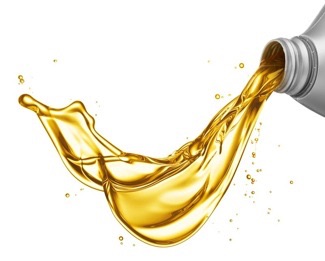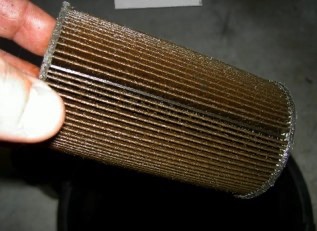
Published in the May 2015 issue of “Die Porsche Kassette”
Is synthetic oil real oil?
Should I spend the extra money in synthetic oil?
What’s the difference between dino and synthetic?
What’s the difference between the different brands of synthetics?
Why is one better?... which one?
OK, let’s go one at a time.
Is it real oil?
The answer is yes and no.
Yes, because dino (conventional) oil and synthetic oil both come from the ground.
No, because synthetic oil starts out as crude oil which gets pumped out of the ground, then gets distilled, purified and broken down to its basic molecules.
The oil companies do this so that they can remove much more of the impurities from the raw oil and they can also customize the oil molecules to perform at much higher levels of protection and performance than with conventional oil.


Because synthetic oil contains less impurities, it keeps your engine cleaner inside.
Synthetic oil also resists the formation of oil sludge, a thick, nasty goop formed when motor oil breaks down from prolonged exposure to high heat and stress. Because of it’s consistency and viscosity, sludge does not flow well and therefore does not get into all of the nook and crannies to protect the engine as it is supposed to do, generating in extreme cases catastrophic engine failure.
Because of it’s reengineered molecules and special additives, synthetic oils can also work more efficiently in weather extremes.
Maybe you have noticed how oil change intervals have been getting longer and longer in the last 10 or 15 years. this is because of what we explained above. There are Porsches where the recommended oil change interval is 15,000 miles, even 20,000!
Although I understand the factory’s reasoning and the intent for environmental protection, I recommend to all my customers and do so myself, no more than 5,000 mile intervals.
Most Porsches are driven right around 5,000 miles per year so that’s a once-per-year oil change. By changing the oil at that interval it also allows you to check the oil filter element and see what it caught in its folds.
If you don’t change the oil yourself, make sure you ask your tech to save the filter for you. Then closely look in between the filter’s paper folds so you can see if it’s catching metal particles and flakes that come from no other place than your engine.
In many cases people have been able to avert catastrophic engine failure by catching it in time through oil filter inspection.

The differences between the different synthetics, when comparing the same viscosity, is basically just the additives used by each oil company.
According to Ullman’s Encyclopedia of Industrial Chemistry, additives in motor oil can comprise up to 5% by weight of the oil.
There are additives for controlling chemical breakdown (detergents, rust inhibitors, anti-oxidants, and metal deactivators) for viscosity (to maintain fluidity at temperature extremes), for lubricity (friction modifiers, pressure and anti-wear agents), for contaminant control (dipersants, anti-foam, anti-misting).
There are also other additives blended into synthetics for the purpose of conditioning the seals and gaskets., so as you can see it gets really complex.
So, how do you choose?
Porsche recommends Mobil1 Synthetic oil for use in all Porsches, but they also publish a list of approved oils worldwide and if you go to any of the Porsche-related Internet forums and ask which oil is better, you’d think you just started World War III.
Take your pick:

For more information on oils and more, please visit my website: www PedrosGarage.com.
Happy Porsche’ing,
Ⓒ2015 Technolab / PedrosGarage.com


